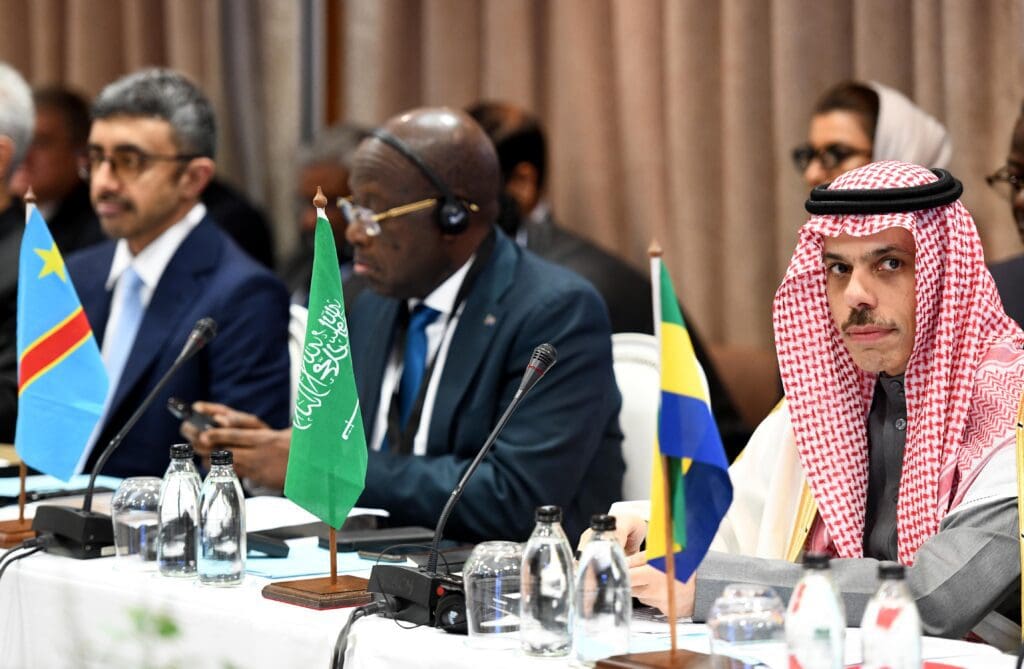As American dominance of the Middle East and North Africa wanes and other world powers step up their efforts to win friends and influence there, long-time U.S. allies are becoming more assertive towards Washington and recalibrating their other ties to better secure their own interests.
The growing U.S.-China strategic rivalry will profoundly impact the region in the coming decades as countries seek to balance their ties with both powers, as well as with Russia. The international system’s shift towards multipolarity poses risks, but for MENA states it also brings opportunities, in the form of more options for security and defense as well as development, finance and economic ties.
While their relationships with the U.S. remain important, regional powers including Saudi Arabia, the United Arab Emirates and Egypt have signaled that they intend to take full advantage of these new openings, and to chart more independent foreign policy paths.
Multipolarity and the Military
As Richard N. Haass and Charles Kupchan wrote last year, “The international system is at a historical inflection point. As Asia continues its economic ascent, two centuries of Western domination of the world, first under Pax Britannica and then under Pax Americana, are coming to an end.” While others argue that the U.S. will continue to be the sole superpower, MENA states are unmistakably preparing for a post-American, multipolar world. This can be seen in the greater role that China is playing in the region, both economically as the region’s largest trading partner, but increasingly diplomatically and politically, as illustrated by its recent mediation between regional arch-rivals Saudi Arabia and Iran.
Russia’s relationships with countries in the region also remain strong, despite its invasion of Ukraine and attempts by Washington to pressure Arab countries to oppose and isolate Moscow. The recent US Pentagon leak shed light on growing UAE-Russia cooperation on defense and intelligence issues. Last month, Egypt rebuffed an American request to block access to Russian military flights in its airspace, and Saudi Arabia hosted Russian weapons manufacturers at a trade event. Despite these firms being sanctioned in the West and having direct links to the Russian military, the Saudi investment ministry was reportedly exploring the possibility of opening an office in Moscow to deepen these ties.
Indeed, moves to diversify arms purchases away from decades of dependence on U.S. weaponry and security architecture, is perhaps the most obvious reflection of how multipolarity is shifting the behavior of MENA states.
In May, Egypt and Saudi Arabia were reportedly in advanced negotiations for major arms deals with China. Kuwait is engaged in discussions with Russia over the purchase of tanks. Such moves have raised eyebrows in Washington. In May, Assistant Secretary of Defense Mara Karlin said the American approach to the region was undergoing a “paradigm shift.” Notably, she urged U.S. allies to continue to use U.S. military equipment because “not doing so would undermine our partnerships as well as elements of our strategic approach to the region”.
More Options for Development
Growing multipolarity offers countries in the MENA region opportunities that go beyond alternative defense and security ties. The economic rise of China and the military strength of Russia, coupled with the emergence of middle powers such as Brazil, India and Türkiye, have challenged Western hegemony and offered alternatives to states wary of perceived interference in their domestic affairs and attempts to impose “Western values.” The emergence of groupings such as the BRICS—an acronym of Brazil, Russia, India, China and South Africa—the Shanghai Cooperation Organization (SCO) and financial institutions like the Asian Development Bank offer a counterweight to the Western hegemony embedded in the international financial system through institutions like the International Monetary Fund and the World Bank.
Efforts by the Biden Administration to gain the loyalty of regional states have faced resistance from governments who want more independence in their foreign policy and see Russia and China as viable partners. This was on display in October 2022 when the OPEC+ group, which includes several MENA states and Russia, decided to cut oil production in defiance of U.S wishes not to do so.
The creation in 2014 of the BRICS’s New Development Bank (NDB) as an alternative to the Bretton Woods institutions has sparked the interest of many countries in the Global South, especially those which experienced painful—and sometimes politically destabilizing—obligations under IMF structural adjustment programs and austerity measures. This helps to explain the recent surge of interest in BRICS among Arab leaders. Algeria, Egypt, the UAE, Saudi Arabia, Türkiye, Bahrain, Syria, Tunisia and Sudan have all stated their desire to join the bloc. Additionally, joining the BRICS, should it occur, might allow members to trade in their own currencies, shaking the dominance of the U.S. dollar. Egypt is already moving to ditch the dollar for its trade with the BRICS.
Some MENA states have also shown an interest in joining the Shanghai Cooperation Organization, dominated by China and Russia. Egypt, Qatar, and Saudi Arabia were recently admitted to the bloc’s Dialogue Partnership, while Bahrain, Kuwait, and the UAE are eager to join. The grouping covers 40% of the world’s population and 30% of global economic output. The grouping is not without its challenges, but in the long term should its members be able to effectively coordinate both at a political and economic level, BRICS will likely increase its global influence and reach.
Harnessing Great Power Competition
Yet it would be a mistake to think that by joining these organizations, MENA states would be siding with China and Russia against the West. Rather, their objectives are to win more policy independence within a multipolar world order and to balance in their relations with great powers. After all, the OPEC+ move to cut crude output was less of a snub to Washington than a move by these states to defend their own interests. A Saudi invitation to U.S.-sanctioned Venezuelan President Nicolas Maduro for a state visit in June 2023—days before U.S. Secretary of State Antony Blinken visited the kingdom—is yet another signal that Washington’s allies want to strike a more independent course. Algeria’s Abdelmadjid Tebboune’s state visit to Russia on June 13-17 was aimed at strengthening bilateral ties and garnering Russia’s support for Algeria’s membership in the BRICS. Türkiye, too, has for years demonstrated its desire for autonomy vis-à-vis the U.S., despite its membership in the NATO alliance.
Still, Gulf Cooperation Council members and other states in the Global South can diversify their economic ties in Asia without jeopardizing their geopolitical partnerships with the U.S. Joining groupings like the BRICS and the SCO rather allows governments, disgruntled with the existing unipolar world order, to strengthen their policy independence and increase their optionality. By building their ties with other powerful states such as Russia, China, and India, these countries can boost their security and economic development, while giving them strategic autonomy in their decision making. As two centuries of Western domination of the world draw to a close, Washington has little choice but to engage pragmatically with this new, multipolar dynamic.
The opinions expressed in this article are those of the authors and do not necessarily reflect the views of the Middle East Council on Global Affairs.



